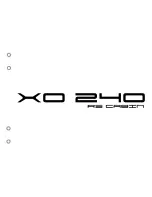
Propeller
Different conditions, including altitude or specific characteristics
of individual bodies of water can impact boating enjoyment. If envi-
ronmental conditions are suspected of negatively impacting perfor-
mance, discuss this with an authorized Malibu dealer, who may be
able to recommend minor changes to the propeller, or replacement
of a propeller at the consumer’s choice and expense, that will im-
prove circumstances for that application. There are limits to changes
that are approved by Malibu engineers. Changes that exceed those
standards will void the warranty. Extreme changes an also alter the
safe handling of the boat and its maneuverability.
Consumers may choose to change char
-
acteristics of propellers or even replace
them. Malibu recommends doing so only
after consulting with an authorized Malibu dealer as exceeding Malibu
standards for the propulsion system will void the warranty.
Care must be taken to avoid being in the
water forward or aft of the boat when the
engine is running, even if the boat is not in
a moving gear. If the shifter/throttle goes into gear, there may not be
time for people to get out of the way. Propeller edges are sharp. With
motion, propellers can maim or become lethal.
Never allow anyone to be in the water forward of the bow or behind
the boat when the boat engine is running, even if the boat is in neu-
tral gear. If the shifter/throttle is inadvertently put into gear, the boat
could potentially run over persons in the water. A moving propeller is
extremely dangerous and could cause serious injury or death.
Surf Gate
Surf Gate, especially when teamed with the Power Wedge III, of-
fers the most innovative wake production in the industry. As with
the Power Wedge III, control of the two transom-mounted gates is
through the 12” Display as explained in the
Dashes and Video Screens
section of this manual. The Surf Gates can also be controlled by the
optional rotary control knob offered in the Sport Dash; the optional
steering wheel controls; or the Surf Band.
The gates are controlled by selecting the desired surf side of the
boat (port/left or starboard/right). When a gate is deployed, the actu-
al desired surf wake will be created on the opposite side of the boat.
For example, when the left wake is desired, select the left arrow; the
right/starboard gate will be the gate that will deploy. The gate will
deploy only between the speeds of 9 mph and 15 mph. If a Surf Trans-
fer is initiated, there is tone played through the Tower Speakers that
signals to boarders/surfers when the surf wake is about to transfer
from one side to the other. This will only happen if Tower Speakers
are equipped, and the stereo is powered on. There is also an indica-
tor light, offered with the optional tower light package, that will also
indicate the surf wake is transferring. This can be deactivated as
explained in the
Dashes and Video Screens section of this manual.
Never place objects on a Surf Gate or try to use a gate to support
a person’s weight. The Surf Gates are not manufactured or mounted
to accept additional weight.
The Surf Gates should always be re-
tracted when not in use.
Always pay attention to how the weight is
distributed in the boat, particularly when
engaged in water sports. Too much ballast,
gate, and passengers to one side of the boat could create an unstable
condition that could create an unsafe situation for all. Even in making
waves, care must be taken to put safe operation first.
Never add any weight to a Surf Gate, nor
use one to hold a person’s weight. The
Surf Gate cannot sustain added weight on
it, and subsequent damage to the Surf Gate or transom of the boat as a
result will not be covered under warranty.
Models: The Surf Gates are optional on most models and standard
on a few.
How It Works—109
Underwater Gear
Beneath the boat are several critical components for the proper
and safe operation of the boat. In general, consumers do not have to
give these items attention beyond routine checks and maintenance,
but if any of them are damaged, it can result in a truncated outing.
Rudder
The rudder is part of the steering system. The steering wheel
turns the rudder in the direction that the driver wishes to steer.
More information about the steering system is available in the
Start-
ing and Operation section of Get Ready in this manual. Note that the
rudder extends below the hull of the boat. This is critical to remem-
ber when boating in shallow water or water with obstructions. Even
if the water appears deep enough for the hull, it may not be deep
enough for the rudder to pass unimpeded.
Do not operate the boat in water too shal
-
low for the rudder to operate. Obstructions
can also damage the rudder, rendering it
inoperable. Such damage is not covered under warranty.
Fins
The fins add tracking stability. As with the rudder, they extend
below the hull and should be considered when boating in shallow
water.
Struts and Strut Housing
The strut and strut housing are fitted from the drive train to the
propeller to create the propulsion that moves the boat forward and
aft. As with the rudder, these components extend below the hull.
Operation in water that is too shallow or among obstructions can
damage the components and make it impossible to continue boating.
Do not operate the boat in water too
shallow for the strut, strut housing, and
propeller to operate. Obstructions can also
damage these components, rendering them inoperable. Such damage is
not covered under warranty.
















































